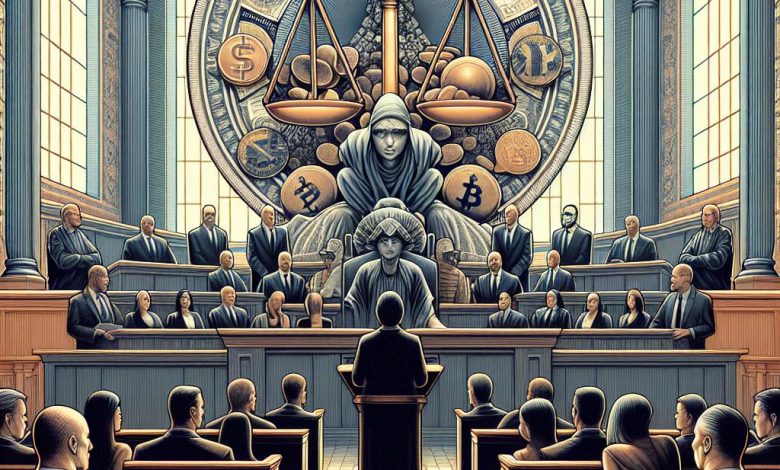
Table of Contents
DOJ Charges Binance and Executives
The U.S. Department of Justice has revealed a series of criminal charges against the cryptocurrency exchange Binance, alleging a network that facilitated extensive money laundering and violated sanctions. These accusations indicate that Binance engaged in transactions that not only breached anti-money-laundering laws but also involved direct dealings with countries and regions subject to U.S. sanctions.
Accusation of Money Laundering and Sanctions Violations
Binance faces charges for its role in the operation of a vast money-laundering scheme. The exchange is accused of enabling the transfer of over $1 billion worth of illegal funds. These activities span across sanctioned nations and have provided financial services to criminal entities. In response, the DOJ has demanded one of the highest corporate fines in American history as part of a settlement.
Involvement with Sanctioned Countries and Criminal Actors
Allegedly, Binance had a significant volume of transactions with users in countries under U.S. sanctions, including Iran, Cuba, Syria, and parts of Ukraine under Russian control, such as Crimea and Donbas. Moreover, they were reportedly connected to Hydra, a notorious Russian dark-web market known for illegal drug sales, data theft, and its money-laundering capabilities.
Criminal Charges Against CEO Changpeng Zhao and Former Chief Compliance Officer Samuel Lim
Changpeng Zhao, the CEO of Binance, along with the company's former chief compliance officer, Samuel Lim, have been specifically charged in these illicit activities. Zhao has pleaded guilty to the charges related to money laundering, which could potentially lead to significant prison time, although the sentence recommendation from federal prosecutors is currently unknown. As part of the realized agreement with the Department of Justice, substantial fines have been levied on both Zhao and Lim.
The Indictment and Plea Deal
In a major legal development, Changpeng Zhao, the CEO of Binance, admitted to wrongdoing in the face of charges for money laundering violations. As a consequence of the indictment, he has agreed to a plea deal with the US Department of Justice. This deal is significant not only for its direct impact on Zhao but also because it reflects the intensive scrutiny that Binance, as a corporation, has been subjected to by authorities.
Zhao Pleads Guilty to Money-Laundering Violations
Zhao's plea acknowledges his role in the scheme and marks a high-profile acknowledgment of culpability in the cryptocurrency space. By pleading guilty to charges related to operating an unlicensed money transmitting business and failing to implement adequate anti-money laundering measures, Zhao has personally accepted the weight of these serious accusations.
Settlement Includes $4.3 Billion Fine for Binance
Binance itself, under Zhao's leadership, has agreed to a staggering $4.3 billion fine as part of its settlement with the authorities. This fine represents one of the most significant financial penalties ever leveled against a corporate entity in the U.S. and unmistakably signifies the severity of the violations imputed to the world's largest virtual currency exchange.
Zhao Steps Down and Agrees to Pay a $200 Million Fine
In addition to the company's liabilities, Zhao has agreed to individual financial repercussions, consenting to pay a substantial $200 million fine. Furthermore, his guilty plea has precipitated a decision to step down from his executive position within Binance.
Lim’s Settlement of $1.5 Million
Samuel Lim, the former chief compliance officer of Binance, has not been left untouched by the investigations. As part of the sweeping legal settlement, Lim is to pay a fine of $1.5 million, reflecting his individual involvement and the company's broader compliance failures.
Binance’s Alleged Malpractices
The indictment against Binance paints a troubling picture of the company's operational ethics and compliance measures. Amidst the accusations, the organization is charged with eschewing necessary regulatory responsibilities and facilitating illicit activities at an international scale, which has profound ramifications for the cryptocurrency sector's integrity.
Alleged Lax Know-Your-Customer (KYC) Rules
The standards Binance purportedly set for verifying the identity of its users have come under immense scrutiny. Initially, the company is accused of having virtually nonexistent KYC requirements despite offering services to U.S. users. It is alleged that it was not until 2021 that Binance attempted to enforce more stringent KYC protocols. However, the indictment suggests that even then, enforcement was lax, with users who were likely engaging in sanction violations allowed to circumvent money laundering checks.
Alleged Willful Blindness to Transactions with Sanctioned Regions
Binance is accused of intentionally overlooking transactions with individuals and entities in regions under U.S. sanctions. Notably, it is claimed the exchange allowed trades with users in Iran, Cuba, Syria, and Russian-occupied areas of Ukraine, with internal communications indicating a conscious effort to obfuscate the presence and activities of users from these locations on their platform.
Allowance of Transactions with Entities like the Dark-Web Market Hydra
The exchange is charged with permitting financial flows to and from Hydra, a notorious dark-web market associated with narcotics, data theft, and money laundering. Such allegations denote a direct link between Binance and a digital hub for criminal activities, amplifying concerns over the exchange's commitment to preventing financial crime.
Alleged Processing of Funds for Criminal Activities Including Terrorism and Child Abuse Material
Beyond the darknet affiliations, the indictment also implicates Binance in processing tainted funds linked to ransomware gangs, hackers, scammers, terrorist organizations such as Hamas, and distributors of child sexual abuse material. These severe charges suggest that Binance's platform may have been leveraged as a financial conduit for a host of illegal enterprises with global repercussions.
Broader Impact and Regulatory Message
The legal punitive measures taken against Binance are not only historic in terms of the size of the penalty but also send a clear and resonant message about the expectations and enforcement of regulatory compliance within the U.S. financial system. These developments carry implications that extend far beyond a single company and touch upon the wider technological landscape.
Binance’s Corporate Penalty as a Significant Event in US History
The fine imposed on Binance, exceeding $4 billion, is unprecedented and one of the largest in U.S. corporate history. This substantial penalty underscores the high stakes associated with non-compliance with anti-money laundering and sanctions laws. The Justice Department has made it clear that financial safety and integrity are priorities that supersede the interests of any single corporation, especially in sectors as novel and rapidly evolving as cryptocurrencies.
Comparison with the Sam Bankman-Fried and FTX Case
The Binance case comes close on the heels of the FTX scandal, wherein its CEO Sam Bankman-Fried faced legal action for mismanagement and fraud. While differing in specifics, both cases highlight the broader vulnerabilities and regulatory oversights in the cryptocurrency industry, emphasizing the necessity of stricter compliance and ethical management practices.
The DOJ’s Stance on the Use of Technology for Illegal Activities
In prosecuting the case against Binance, US Attorney General Merrick Garland made it clear that innovation cannot be a guise for illegality. Emphasizing this point, the DOJ stands firm on the principle that advancing technology does not exempt companies from existing legal frameworks, and that attempts to exploit these technologies for criminal purposes will be met with rigorous enforcement.
Emphasis on the Laws Applying to New Technology Companies
The cases against Binance and other technology-driven enterprises reinforce the DOJ's position that the laws apply equally to all, including new and emerging companies in the tech sector. The enforcement actions are a reminder that adhering to legal obligations is not optional, regardless of the field in which a company operates, and that regulations are in place to safeguard both the economy and consumers from unlawful behavior.




